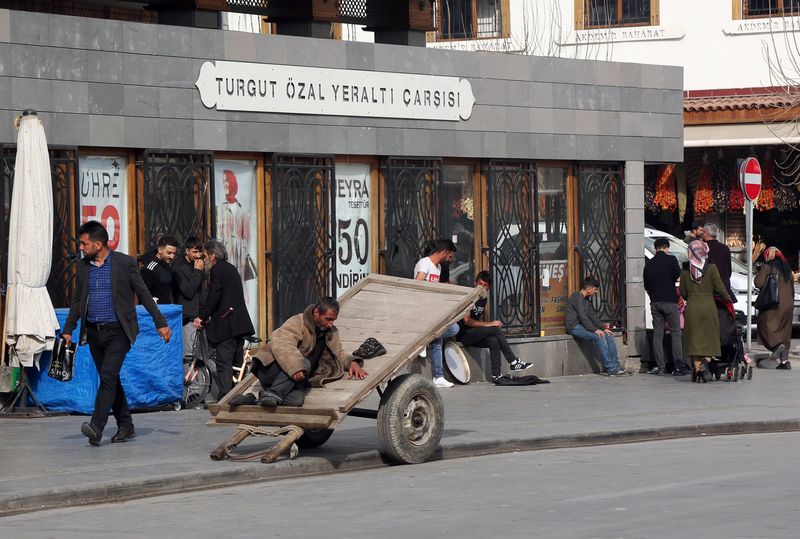By Ezgi Erkoyun and Ceyda Caglayan
ISTANBUL (Reuters) – Berkay Ucar has virtually given up hope of discovering work after his eight-month search solely generated a number of unsuccessful interviews.
Dwelling together with his mother and father within the capital Ankara, 24-year-old software program developer Ucar, is one among a quickly rising variety of despondent job seekers in Turkey. For him, the psychological toll of unemployment is bigger than its monetary burden.
“My wage and different expectations are on the minimal stage, however I nonetheless cannot discover a job. Psychologically it is rather troublesome for me. I’m shedding hope.”
Eighteen months into President Tayyip Erdogan’s abrupt pivot to financial orthodoxy, aggressive rate of interest hikes and different tightening measures to tame hovering inflation are more and more undermining job seekers’ prospects of discovering employment.
The quantity of people that misplaced hope of discovering work and who’ve stopped actively trying jumped by some 30% because the new financial programme was launched in June 2023, in accordance with information by TUIK statistics institute.
Knowledge reveals there are greater than 2.17 million folks on this class within the third quarter who are usually not counted as unemployed.
Turkey’s unemployment charge stood at 8.6% in September, with round 3.1 million folks searching for jobs, however economists say that this doesn’t mirror the precise image within the labour market and that the outlook for subsequent 12 months is way worse.
Turkey’s coverage U-turn, ditching a earlier low-rates coverage championed by President Erdogan, is geared toward boosting exports, decreasing inflation and rebalancing an overheating financial system. However the financial ache created by a power cost-of-living disaster has dented his AK Social gathering’s reputation.
The federal government is dedicated to the inflation combat now – with bullish overseas traders taking discover – however employees’ rising angst might take a look at Erdogan’s resolve to remain the course subsequent 12 months, simply as annual inflation is lastly headed down.
Industrial output has dropped 4 months operating and GDP development slowed to 2.5% within the second quarter. The deteriorating demand outlook, together with excessive borrowing prices, has triggered firm layoffs, notably in manufacturing, equivalent to clothes and textiles.
Finance Minister Mehmet Simsek has mentioned this month the federal government is taking measures to restrict the short-term adverse impression of the financial programme and that rising confidence and higher international circumstances will assist jobs and exports.
FEELING HELPLESS
Sema, 29, who didn’t present her full identify, is a type of who’ve given up looking for work. She moved to Istanbul to discover a job in promoting, however gave up hope and moved again to her mother and father home in western province Kutahya to avoid wasting on lease.
“I’ve no cash and I’m in despair. I’m not searching for a job anymore as I do know there may be nothing on the market for me. I really feel ineffective, helpless and unsuccessful, like I did one thing mistaken someplace,” she mentioned.
Analysts say conventional unemployment information doesn’t seize the dimensions of the issue and Aylin Ingenc Eker, a researcher on the Social Coverage Analysis Heart at TOBB ETU College in Ankara, calculates further indices to get a more true image.
In response to her calculations, bearing in mind job high quality and the impression of inflation, an index that analyzes financial difficulties individuals are experiencing has risen to close pandemic ranges because the begin of the brand new financial programme.
Within the third quarter, employment elevated by 136,000 folks, which economists linked to the necessity for employees to rebuild areas hit by the devastating earthquake in February 2023 in southern Turkey and rising demand within the tourism sector.
Analysts say Ankara faces a serious take a look at of its dedication to reining in inflation at end-2024, when it’s anticipated to once more hike the minimal wage. A big rise would assist employees claw again actual earnings losses, however might stoke labour prices for companies already struggling.
Economist Can Fuat Gurlesel mentioned {that a} doable 25-30% enhance within the minimal wage might trigger companies to put off workers however lower than that won’t be sufficient for workers.
The Turkish central financial institution forecasts year-end annual inflation of 44%.

“A 25% enhance is manageable, however 30% is the utmost restrict, the crimson line. I’m not certain if all corporations can deal with that with out shedding workers, particularly within the manufacturing sector,” he mentioned.
“No sector can afford a minimal wage enhance of over 30% on this financial system.”









